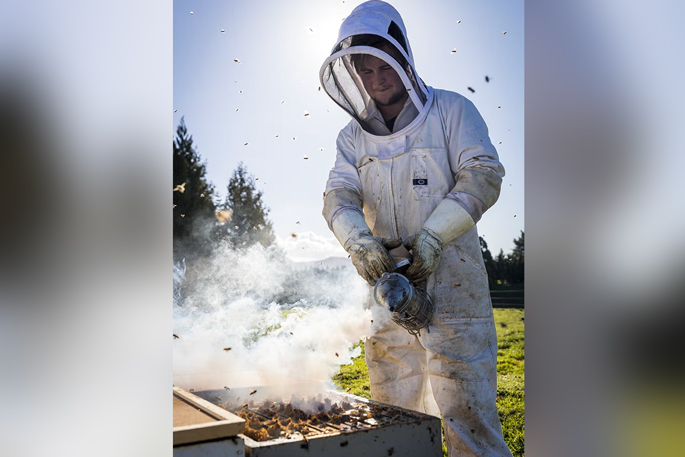A local honey producer says they have seen a strong 2024/2025 season, with the weather on their side and a particularly favourable spring.
The local economy has also benefited, with orchardists and other agricultural businesses enjoying the fruits of the bees’ labour due to increased pollination.
“This season the hives are looking strong and healthy,” BeeNZ owner and general manager Julie Hayes says, who runs the family-owned and operated business based in Katikati alongside husband David.
“The 2025 honey harvesting season started a little earlier for us due to the warmer weather we’ve seen here in northern Bay of Plenty.
“The health of our hives and the warm spring for flowering helped build confidence that we would produce a good amount of our prized mānuka honey in the 2024/25 season.”
Bountiful supply
Julie says the predicted good honey harvest season means a bountiful supply of honey with good mānuka markers and healthier and stronger bee colonies.
“Being able to meet market demand is always positive, which in turn helps strengthen honey businesses financially and this flows on to support the regional economy.
“Local farmers and orchardists also benefit, as bees play a vital role in pollination, boosting crop yields and quality across the board.”
Buzz Apiaries Ltd has 1000 hives, and is vertically integrated with BeeNZ Ltd, producing and marketing its own brand and supplying private label internationally.
Singapore, Malaysia and Saudi count as its top three markets.
Completing the circle, they rent out hives for pollinating avocado and kiwifruit orchards.
Kiwifruit pollination
The Hayes family originally entered the honey industry as they needed hives to pollinate their kiwifruit orchards.
Buzz Apiary was established in 2008 when they built an extraction facility for their hives and for other beekeepers in the area as beekeeping was gaining popularity.
Processing and distributing honey themselves was the next step, and in 2015, they removed a block of kiwifruit to build a processing and packing facility and BeeNZ Ltd was launched.
To spread the supply risk, BeeNZ Ltd is also a 50% shareholder in a bulk honey trading and distribution company based in Timaru.
A family affair
The couple employ 12 people who get on-the-job training.
It’s also a family affair, with two of Julie and David’s sons being beekeepers, and their daughter-in-law looks after the communications and marketing side of BeeNZ Ltd.
“Our kiwifruit and the honey harvesting businesses work perfectly together, as the on/off seasons for each coordinate well to allow for year-round employment for our team,” says Julie.
“We have the ability to transition staff in from our other business when the busy season is upon us.”
Commitment to sustainability and environmental care is a big focus, with the business achieving B-Corp status in 2022.
It holds a number of other accreditations including the Fernmark, which is used to promote products that are authentically made in New Zealand, and Toitu Enviromark Gold certification, which recognises their environmental efforts.
“It is important to us as business owners and operators to do “business for good” and show care and respect to our people, planet and communities. We also like to share our knowledge and experience.
“Our beekeepers have participated in workshops and industry events to spread awareness about the role of bees in fruit pollination and how kiwifruit orchardists can contribute to protecting bees too.”
Managing challenges
While the business has had to manage the ongoing challenges around the increased costs for labour, fuel and transport, and controlling varroa mites, Julie says that overall, the mental health of beekeepers is better than previous seasons.
“This is due to seeing strong healthy hives, confidence in the future honey harvest and a lift in the global economy to sustain demand for manuka honey
It’s a sentiment reflected by UMF Honey Association CEO Tony Wright, who says while many beekeepers are currently experiencing major challenges, the $750 billion global natural health food category continues to present strong long-term opportunities for mānuka honey producers.
A young industry
“Mānuka honey is a young agricultural industry that after a long period of growth, is having to look hard at how it is structured in a world that looks very different than the one the industry grew up in.
“However, there is plenty of potential for future success in the New Zealand industry as the prospects for long-term exports of mānuka honey remain good.
“Mānuka is only just getting established in some major markets and as people continue to move more and more toward natural health solutions, they can trust mānuka will be an important part of the category.”
Modern scientific discoveries have substantiated the bioactive properties of mānuka honey and its health attributes.
The mānuka tree has a 1000-year history of healing in Aotearoa, and now mānuka honey’s health properties are at the heart of a honey export industry that generated over $420 million in export revenue in the 12 months to August 2024.



0 comments
Leave a Comment
You must be logged in to make a comment.